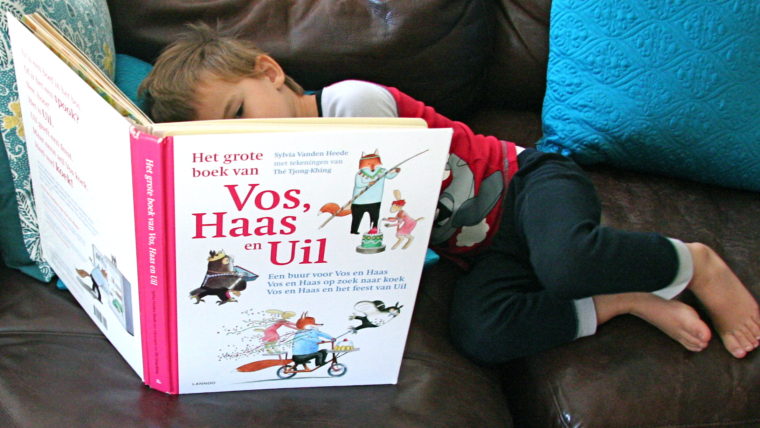
– by Veronique Vanderbeke
When we got pregnant with our son, there was no doubt in our minds that we wanted to raise him bilingual. My husband’s family speaks English very poorly. (Which is kind of hard to do in a country that prides itself on its language skills.) The grandparents already had a hard enough time dealing with one of their grandsons growing up with an ocean between them. How sad would it be if they couldn’t even talk to each other?
I did not research a lot about raising a baby. In hindsight, I am baffled about how casual I was about the whole ordeal. But I did look into the best way to go about raising a bilingual child.
Turns out there is no best way. Very little research seems to have been done about it. (Or it is hard to find.) So I can only tell you how we did it. And what our results have been so far.
At almost three years old our son speaks English and Dutch as well as can be expected of a toddler. Full sentences with some grammatical mistakes here and there. His Dutch does have a horrendous American accent. But it seems to be getting less noticeable.
Even when he was still in my belly, I started speaking some Dutch. I had read that fetuses differentiate between two languages. From the moment when he was born, I tried my hardest to speak Dutch to him. My husband, also a Dutch-speaking Belgian, got to stick to English. We made that decision based on our accents. As much as my son has an American accent, I have a horrible Dutch accent.
In the beginning, with such a small baby, I would sing Flemish songs to him. (Flemish is the Belgian Dutch dialect.) Even though I hadn’t discovered RIE yet, I instinctively talked him through diaper changes. I fondly remember struggling to find the Dutch word for diaper. After only 4 years in America, I had already forgotten so much.
My son’s first word was ‘ball’. “Ba.” It might not be a coincidence that this is ‘bal’ in Dutch, with almost the same pronunciation. He said it right around 12 months. Although he might have been saying it earlier, since this mama thought children pronounced their first words perfectly. It took him pointing at a picture of a ball repeatedly, while saying “Ba”, before I put two and two together. Poor kid must have been so frustrated.
From then on his language took off like a speed train. By 18 months he was forming two word sentences, in both languages. He would effortlessly switch between Dutch and English, depending on whether he was talking to my husband or I.
Right after our big move from California to Ohio my son stopped speaking Dutch. It made me a little sad. But I respected his choice, while I doggedly continued talking in Dutch to him. He understood what I was saying, but would always reply in English.
And then, 6 months later, oma and opa came to visit. They also brought his 6 year old cousin B. One week later my son was speaking Dutch as if he had never stopped. In the same effortless way he articulated himself in English. The only difference? That big, fat American accent.
So far I can say that our bilingual adventure has been a smooth one. Our son never had a speech delay. To the contrary, he is extremely verbal for his age. At this point I also notice that he picks up other languages too. Or at least notices another language is spoken. When he plays with his Croatian or Indian friend, he will tell my husband afterwards about the words his friends use. Example: “T. always says: “što je da, mama?” (Yes, I had to google the spelling, since we only know the pronunciation.)
Research also shows that bilingualism gives children an advantage later in life too. We’ll have to wait and see about that. Right now we are just happy that oma and opa can skype with their grandson and do more than just wave at him.

This is so fascinating to read about! I’m so glad you’ve been successful.
I tried to convince my Russian-speaking husband to teach our son his native tongue while I spoke English to the baby, but he never really did. Instead, our son T only hears Russian when daddy’s frustrated!
We also have 2 bilingual children 🙂 This is a good topic to write about!
We have a tri-lingual child. She is almost 3 and while she understands perfectly all 3 languages, she prefers to speak English with some infusion of other languages. I think the issue is that we speak English at home since we don’t know each other languages, but we do speak our own languages to her. I really hope she will speak all 3 languages!
Just keep it up. If she understands, she can speak it. Although maybe with a horrible accent. 😉
My daughter spoke mostly Russian for the first two years and then she almost completely switched to English. I respect her choice, although do my best to speak to her in Russian. She replies in English. Hopefully, it’s still at the back of her mind. I really want her to be able to communicate with my parents in Russian on Skype. Right now she says most things in English but understands everything I say.